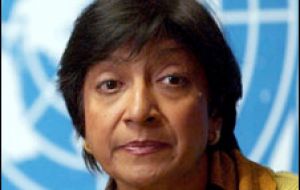MercoPress. South Atlantic News Agency
UN: Sixty years on Human Rights still not a reality for all
 UN Commissioner for Human Rights Navi Pillay
UN Commissioner for Human Rights Navi Pillay The promises enshrined in the Universal Declaration of Human Rights (UDHR) remain unfilled for tens of millions of people worldwide, the top United Nations human rights official said on the eve of the December 10th landmark document's 60th anniversary.
After World War II, many were determined to ensure that there would never be another Holocaust and that everyone – especially the poor, hungry, displaced and marginalized – would have institutions and laws to protect them, the UN High Commissioner for Human Rights Navi Pillay told reporters in New York. The Declaration states that everyone has the right to life, liberty and security and that all – regardless of race, gender, colour, sex, language, religion or political opinion – are equal before the law. "Despite all our efforts over the past 60 years, this anniversary will pass many people by," the High Commissioner said. "Tens of millions of people around the world are still unaware that they have rights that they can demand, and that their governments are accountable to them, and to a wide-ranging body of rights-based national and international law," she added. Ms. Pillay also stressed that the global financial crisis could compound the dire situation faced by the poorest and most marginalized people around the world, adding that poverty is both the cause and a result of human rights violations. "We will need to be extremely vigilant over the coming months to ensure that development programmes and social safety nets are maintained or enhanced, so the effects of the crisis do not become calamitous," she said. Despite the growing influence of the Internet enabling journalists, non-governmental organizations (NGOs) and other civil society groups to expose human rights abuses, "no country in the world can sit back complacently and say, 'We're there,'" said the High Commissioner. Welcoming the designation of 2009 as the International Year of Human Rights Learning, she encouraged governments, teachers, parents and "others in a position of responsibility all across the planet to take this opportunity to ensure that the next generation is given the maximum opportunity to claim what was promised to them in that extraordinary document known as the Universal Declaration of Human Rights." In related news, a special UN advisor to the General Assembly President on water issues said today that the right to water must either be added to the UDHR or else be enshrined in a separate covenant. Waterborne diseases are the leading cause of death for children, and "in every single case, if their parents could afford clean water, they would not have to die," said Maude Barlow. Characterizing the situation as "the most powerful and important face of inequity in our world," she underscored the need to protect the world's finite water sources as a human right. "With declining fresh water sources and the demand growing so quickly, we're now at a situation in the world where who owns and controls water is going to be very powerful," the advisor cautioned.




Top Comments
Disclaimer & comment rulesCommenting for this story is now closed.
If you have a Facebook account, become a fan and comment on our Facebook Page!